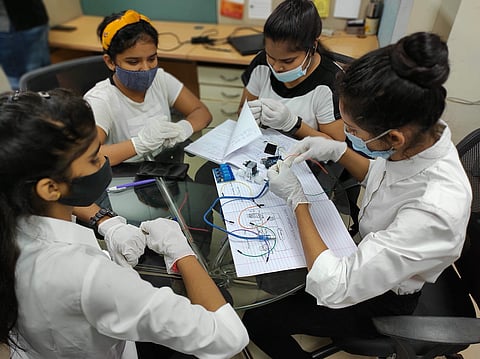

“Skill development courses and opportunities are offered to school dropouts frequently, but it isn’t done for school students,” believes Gaurav Arora from Salaam Bombay Foundation. The not-for-profit organisation has been working with municipal and government school kids, trying to equip them with vocational skills and complementary learning. Gaurav says that although there are government schemes and CSR initiatives from companies to “help” these kids, they aren’t going deep enough. “The moment they turn 14 years old, their parents don’t see value in education. They turn to menial jobs such as car washing or newspaper delivery. There is actually a very real pressure on kids to drop out,” observes Gaurav.
To fill this particular skill gap, the not-for-profit organisation had started the skills@school campaign seven years ago. It has been providing kids with skill development courses in areas such as wellness, technology, graphic design, robotics and beauty, among others. “We are trying to bring aspirations to the students, allowing them a chance to dream independently,” says Gaurav.
It was in the course of this campaign that they realised that the students they were working with had the ability to transform these skills into something more substantial. They had already started monetising their abilities in various areas. Some of the students who had taken the baking and confectionery course at the programme had started creating and selling simple cakes made in pressure cookers.
Abhishek Kumar Agrahari, a Class X student had signed up for the Home Appliances programme, he learned to repair various appliances, and was soon earning for himself; in fact, earning enough to purchase a smartphone to continue his studies online when the pandemic hit. Abhishek has enrolled in the Industrial Training Institute and plans to turn his expertise into a brand.
“Skills are not enough for those who want to be entrepreneurs,” says Gaurav, adding that internship opportunities and training are required to bridge that gap. That’s when the need to nurture their drive for business was felt and the foundation came up with an initiative to offer incubator facilities to students who pass out from the skills@school campaign at age 18. The programme is titled Entrepreneurship Incubator for Grassroot Adolescents.
The question that probably arises here is: will these kids have a financial support structure once they leave the programme and will they be able to gather the resources required to continue building and investing in their business?
“Our attempt to answer that would be that there are a lot of resources available through government schemes such as the Mudra scheme which gives loans between Rs 50,000 to 5 lakh. The eligibility needs solid business plans. People who provide these loans say that it is a boon to have them in the system from a young age. They have transactions to show on their bank account, income and expenditure related to the skill they have mastered and the business they are trying to build. It brings a lot of credibility. Most importantly, they gave a solid business plan that covers pricing, costing, marketing and managing cash flows. Microfinance organisations look for these specifications, and our incubator will help these kids leverage those schemes,” says Gaurav.
The incubator intends to allow kids from potentially resource-crunched backgrounds to capitalise on the skills they have mastered and lay the groundwork to get their business up and running.
